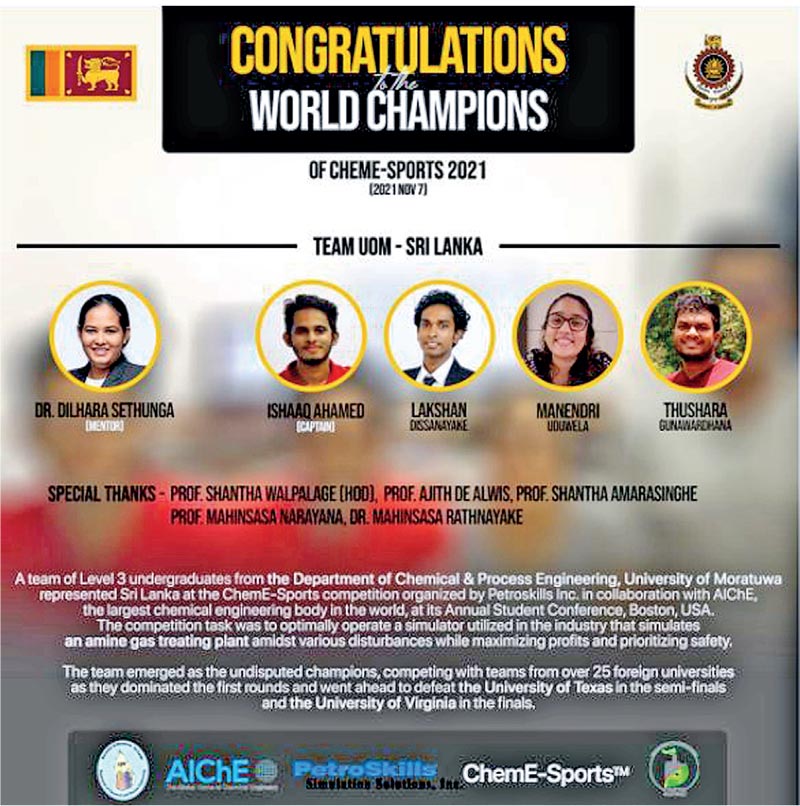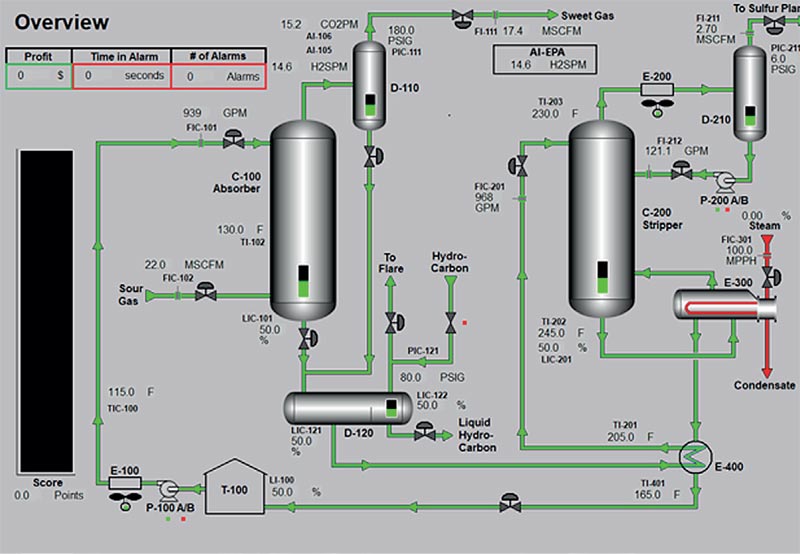Friday Feb 27, 2026
Friday Feb 27, 2026
Thursday, 17 February 2022 03:08 - - {{hitsCtrl.values.hits}}

By Ishaaq Ahamed
|
The Academic Mentor Dr. Dilhara Sethunga
|
A team of Level three undergraduates from the Department of Chemical and Process Engineering, Faculty of Engineering University of Moratuwa represented Sri Lanka at the ChemE-Sports competition organised by Petroskills Inc. in collaboration with American Institute of Chemical Engineers (AIChE), the largest chemical engineering body in the world, at its Annual Student Conference, Boston, USA. The competition task was to optimally operate a simulator utilised in the industry that simulates an amine gas treating plant amidst various disturbances while maximising profits and prioritising safety. The team emerged as the undisputed champions, competing with teams from over 25 foreign universities as they dominated the first rounds and went ahead to defeat the University of Texas in the semi-finals and the University of Virginia in the finals.
Chemical Engineering and E-Sports?!
Toothpaste. Petrol. Plastic Chairs. Three day-to-day, commonly available items that we usually take for granted amidst our busy lives. But in the eye of the Chemical Engineer, these are items painstakingly crafted using science, technology, and engineering – often involving centuries worth of research and engineering. Unfortunately, Chemical Engineering is often confused with Chemistry. In simple terms, if Chemistry is akin to boiling a pot of water then Chemical Engineering is akin to boiling 10,000 litres of water within the same timeframe. Or in other words, Chemical Engineering amplifies lab-scale research into multi-national ventures.
Everything we do, from brushing our teeth to refuelling our cars, involves Chemical Engineering in some form or other. Indeed, much of the comfort we enjoy today is possible thanks to Chemical Engineering. The sheer scope of the field is why I fell in love with it; there is always novelty. I enrolled in the Department of Chemical and Process Engineering (DCPE), University of Moratuwa, in 2018. As part of my undergraduate life, I have experienced many things ranging from hectic exams to memorable hikes. But this is the story of one of my best and most curious university experiences to date.
Our Story
The Beginning
Emails. The bane of the professional world. Emails come in all forms, shapes, and sizes; work, advertisements, promotions, scams, and such. Although emails have driven all of us to exasperation at one point or another, there is no escaping this force of nature. Yet oddly enough, it was a random email that sparked this curious journey.
Somewhere in September, the semester exams were (thankfully) just over, and I was dutifully on the lookout for opportunities. Therefore, I was vigilant in my inbox and kept visiting it to the point of obsession. Hours became days, and days became weeks yet my inbox remained as dry as ever.
One random day, I just happened to visit my inbox which was still coldly devoid of anything interesting, or so I thought. Scrolling down the list, I noticed a random Promotional email titled “Sign up by September 14th to compete in ChemE-Sports!” from AIChE. A little more digging gave me the insight I wanted. It turned out to be a competition of some sort, scheduled during the upcoming AIChE Annual Student Conference in November. I lost no time in contacting my batch mates – Lakshan, Thushara, and Manendri – and we registered for the competition half an hour ahead of the deadline. But, of course, the registration was just the tip of the iceberg. We needed a mentor, and we sought the aid of our lecturers. Dr. Dilhara Sethunga agreed to mentor us with her wide range of experience and knowledge in the field. Soon, we rolled up our sleeves and set to work.
The Competition
The Age of Oil began somewhere in the 1800s, and the world has primarily been running on hydrocarbons ever since. And like emails, hydrocarbons also come in all shapes and forms, like LPG, gasoline (petrol), diesel, and gasoline. Sparing you the technical details (if you so choose!), this particular competition focuses on purifying hydrocarbon gases based on an industrial simulation software provided beforehand. This purification is vital in ensuring quality fuel and preventing environmental pollution.
As with any industrial plant, the number one objective is to operate the process simulator safely by minimising the alarms tripped and working around system failures. One minor, unaddressed system failure can cascade into a whole jumble of nightmares. So, the challenge was to identify these “minor” failures, nip them in the bud and prevent them from escalating into catastrophes. The second objective is straightforward; maximise profit by maximising the product quantity. Based on these criteria, the software automatically evaluates the final score for a 20-minute run.
Warning - Technical Details ahead!
The process diagram is shown below. Here, an Absorption Column is utilised with Diethanolamine (DEA) solvent to purify the sour hydrocarbon flow from Hydrogen Sulphide and Carbon Dioxide. The pollutant-rich DEA is subsequently stripped in a Stripping Column, and the regenerated DEA solvent is recirculated back to the Absorption Column. Both the absorption section and stripping section are equipped with a knockout drum and reflux drum respectively to redirect entrained solvent vapours back into the system. Meanwhile, Purified Sweet Gas (main product) and Sulphur Overhead (by-product) leave via a Knockout and Reflux drum respectively. Heat is provided to the system via a steam heat exchanger whilst an ancillary Flash Drum is placed between the Absorption and Stripping Columns to remove Hydrocarbons dissolved in the solvent.
Showtime
Chemical Engineering is a highly practical profession involving gigantic plants and machinery with some industrial sites as large as cities. Thus, it can be notoriously expensive to organise undergraduate competitions, especially amidst a pandemic. ChemE-Sports is one of the few opportunities in this regard, and we were determined not to give up without a fight. Apart from some preliminary sessions, we did not get much guidance or practice material from AIChE, nor did we know what our foreign opponents were up to.
So, we decided to make the best of what we had. Being great over thinkers, we prepared for every possible competition scenario short of an earthquake. Every minor piece of equipment was individually studied, documented, and summarised in an endless spreadsheet. Weeks after weeks of preparation under the guidance of our lecturers involving many sleepless nights and sore eyes finally culminated on that fateful day - 7 November.
We all gathered at Thushara’s place for the big event. Naturally, we were pretty anxious because of all the things that could probabilistically go wrong: network issues, blackouts, software failures, and so on. The final straw was that we were the only team representing Sri Lanka and were going up against some of the biggest names in the world. And despite our preparation, our only expectation at the time was to somehow survive past Round 1. And thus, we printed our spreadsheet grids, rolled up our sleeves, finalised our strategies, and set to work.
Come 7 p.m. the event finally initiated, Round 1 began, and the game was on. This round consisted of two twenty-minute runs, and – thanks to our fanatic preparation – we almost effortlessly mitigated every failure thrown at us and ranked first on the Leaderboard amongst 25 universities! Pumped with adrenaline – perhaps a little too much – we stepped into Round 2 with sky-high confidence.
During Round 2, we were up against three other teams and had to score the highest to advance onto the Semi-Finals. We started smoothly and stuck to our previous strategies. One irksome valve and a few rash decisions later, the whole simulator was blaring like a siren, and our score began spiralling down. Thankfully, by some miracle, it turned out that we still had the highest score against the other three teams, and so, we advanced onto the Semi-Finals.
After the high of Round 1 and the extreme low of Round 2, our heads were where they needed to be for the rest of the competition. Confident but focused. In the Semi-Finals, we went up against the University of Texas and then moved on to compete against the University of Virginia in the Finals. We faced increasingly-difficult challenges throughout but we calmly identified the problems, developed a strategy, and executed it to perfection. We all played to our strengths, counteracted each other’s weaknesses, and managed to defeat the University of Virginia by one whole point.
We were declared Champions on the spot, and we were (and still are) pretty much over the moon about it. It is still hard to believe that four of us from a tiny island went on to win against top universities in the world. They say that many dreams never manifest into reality. But in our case, we are thankful it turned to be quite the opposite - something that never occurred in our wildest dreams manifested into a blissful reality.
But beyond everything, we are proud to have taken the name of Sri Lanka to the international arena and brought glory to our motherland amidst all other nations present there. The entire department and university are exuberant over our victory and are highly excited for what the future holds. We are confident that this victory would blossom into much grander opportunities for our department and profession in the future.
So despite all odds, believe in yourself, work with diligence and aim for the sky. And last but not least, folks...check your emails for who knows the hidden treasures that lie within!


The process diagram
(The writer is the Team Captain of Chemical Engineering at the University of Moratuwa.)